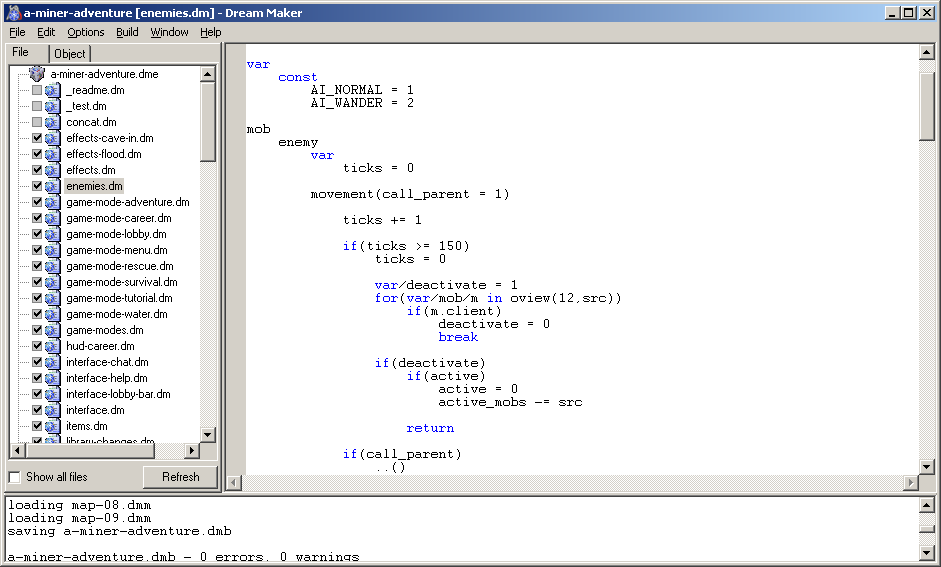
But, I still suggest them here, because I'm pretty convinced it would be the best thing. I'm sure that these suggestions would be marked as "not feasible" in the forums. Even if my suggestions here are not pursued, I still believe Dream Maker could use some upgrades to help developers create more efficiently. But, after meeting the current BYOND community's needs/wants, I think that creating a non-coder friendly Dream Maker would be the next best step. I'm sure expanding to non-coders would be a big endeavor, since Dream Maker currently isn't designed that way. Expanding to non-coders would expand the game designer base a lot. I even know of some people who are fairly active BYOND players who don't make a game here because coding is just a bit beyond them. From a hobbyist perspective, BYOND is a nearly ideal engine for multiplayer games, since it is so versatile, yet has such easy code. I think BYOND would thrive much better with more options for new developers.

There are now more competitors who have introduced "no coding required", which lure many novice developers, including my own development team (which includes a non-coder). For me, game design and coding are a hobby, while the work I've trained in is in another field.īYOND got its start by being extremely remarkably easy to use to make a game, around the turn of the millennium. I still enjoy making videos and generating a positive community experience for hobbyist game designers, but I do need to make a living. However, since YouTube has really hit smaller channels' revenue drastically, my incentive to make YouTube videos has gone down.

I am interested in contributing to the community with tutorial videos and libraries, which I enjoy doing. I suggest BYOND/Lummox seek to expand the options for game development with minimal coding or even no coding required, and to continue to focus on being one of the very best engines for indie multiplayer game development. Newcomers to game design tend to pick a "no coding required" engine, while experienced coders often gravitate toward something even more hardcore that is used by professionals. BYOND has an excellent easy-to-learn coding language, but lacks many of the "no coding required" features (although BYOND has other major draws, like interface customization and a built-in image editor). Current game engines tend to advertise that "no coding is required" but then also provide options for coders to learn the special language of the engine. My impression by the success of RPG Maker MV is that development of BYOND, when not focused on the active community, should seek to improve ease of use for non-coders, and to focus on its strengths of being multiplayer friendly and being easy to use.

That being said, BYOND has a uniquely easy-to-learn programming language, and a unique focus on multiplayer game development that is lacking in most game engines. With more engines succeeding in supporting title releases on most platforms, the competition for BYOND has become more stiff. I think the competition has resulted in BYOND game submissions being down, since game developers are using various other engines.
BYOND 512 SOFTWARE
I don't think I ever ran any DOS software that needed more than 8 mb, or had any benefits from having more.There is a lot more competition among game design engines, these days. The total amount wasn't all that relevant. There are also applications that cannot work when XMS and/or EMS is enabled.īack in my DOS days, I had a boot menu which had 6 different configurations, to cater for all my different applications' needs.
BYOND 512 DRIVERS
Some applications also need a lot of free conventional memory, so you may need to configure upper memory blocks and load drivers into that region to free up that memory. So it all depends on the applications you're running, and what memory they need/use.Įg, if you have memory, you can load a diskcache such as smartdrv.Īnd some applications can use XMS or EMS to improve their performance. So DOS itself works the same, no matter how much memory you have (the only exception is where you don't have enough memory to load DOS itself). In DOS, it all depends on your own usage.ĭOS doesn't have any kind of background processes or automated settings.


 0 kommentar(er)
0 kommentar(er)
